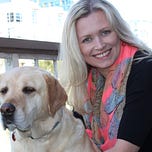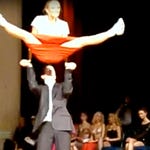My PhD research aims to identify the building blocks of transformation. While many are optional or even interchangeable, the first follower is essential. And it is through my research and interviews with seasoned changemakers around the world that I realized that I routinely serve as this building block.
I am a professional first follower. While I spearhead transformation, my impact rests largely with the changemakers I back. Individualistic societies distort our understanding of leadership as being the originator or the focal point, overlooking that following is a powerful form of leadership.
Before we go on: “the first follower” does not refer to the first “like” on social media. Rather, I am talking about the crucial role that a changemaker can play when they choose to align their path with that of another.
Image credit: quhl from Pixabay.
The first follower transforms a lone nut into a leader
If you haven’t seen the video of a guy starting a massive dance craze at a festival, do. It is as lighthearted as it is profound. Derek Sivers’ commentary offers my favorite quote on the topic:
“The first follower transforms a lone nut into a leader.” — Derek Sivers
Behind every person with name recognition are dozens if not thousands of people leveraging all they’ve got. Followers legitimize both the leader and the cause, and the greater the follower’s clout, the more weight they add to their side of the scale. This is understood in research and politics, where the best and brightest vie to “work under” a visionary politician or an audacious scientist. Sadly, it is not practiced nearly enough elsewhere, and we must change that if we want to become more effective in remaking the world for the better.
The first follower sets the tone for the movement
Another of Derek Sivers’ apt observations about building movements is that “new followers emulate followers — not the leader.”
“New followers emulate followers — not the leader.” — Derek Sivers
If you have ever watched The West Wing or Madame Secretary, consider the function of Leo McGarry (John Spencer) and Russell Jackson (Željko Ivanek). As their Presidents’ Chiefs of Staff, they are expert first followers. They define and enforce what is expected and acceptable. Similarly, I have recognized that as the first follower, I model how the changemakers I have chosen to back are to be followed by others: respectfully, resourcefully, energetically, and collaboratively. I also set the tone for how others can show up for the cause, which often means validating the challenges inherent in transitions, normalizing individual experiences, and encouraging vulnerability.
Images: Leo McGarry (John Spencer) of The West Wing and Russell Jackson (Željko Ivanek) of Madame Secretary.
Following is an undervalued form of leadership
Especially in the early days of a cause, it is the first follower(s) that determine whether that venture will live to see another day. While emotional support is important, it is active support that is vital. We follow by volunteering time; by funding, mentoring, actively listening, and troubleshooting; by joining Boards and committees; by opening doors and extending influence; by removing obstacles in the way of the changemaker we’ve backed; and by doing whatever else might make their day a little bit easier.
It is heartbreaking how many changemakers squander time looking for a cause of their own. I want to make sure this is heard by any reader grappling with the pressure to either lead or drop out: there is an utterly robust third option. Follow!
If at all not ready to step to the plate, then follow, and do it well. Put all your weight behind other people’s changemaking. You will not only create change but learn how to do it better. Vitally, you will deepen your self-awareness, which is a core competency of effective changemakers. By backing another’s cause, you will learn how to enable others to follow your lead when the time comes.













